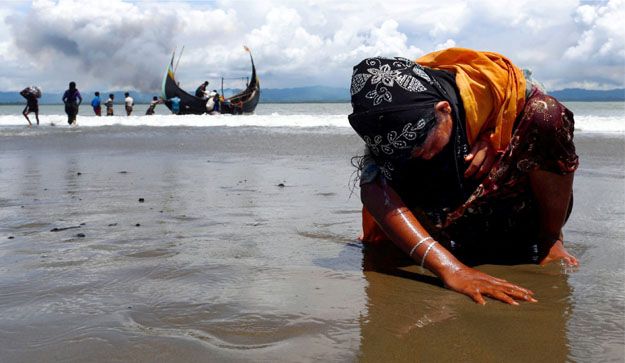The Rohingya Crisis, An unending tale of miseries

Nationalism is running high in current global system. Ethnic and religious minorities are prime victim of this nationalist fervour as they are used as scapegoats by jingoists. The ongoing plight of Rohingya community in Myanmar is a glaring example of this nationalist onslaught on minorities.
The recent episode in persecution of the Rohingya started in 2012 when riots in Rakhine state broke out between Rohingya Muslims and ethnic Rakhines. The latter had tacit support of country’s military regime and extremist Buddhist monks. They used cut-and-dried nationalist rhetoric against Rohingya asserting that they are aliens and do not belong to Myanmar, notwithstanding that the claim finds no base if one looks into the history of this region.
Even though Rohingya are ethnically different from other people of Myanmar and they do not speak Sino-Tibetan language like other ethnicities in Myanmar do, historically they are a native community of Arakan, which is known today as the state of Rakhine. Rohingya are inhabitants of this region since 5th century when local rulers brought them here as slaves. They embraced Islam following the preaching of Muslim Arab missionaries who have been involved in trade in the region since the 9th century. Rakhine and Rohingya communities governed Arakan together till the conquest of this region by Burmese Kingdom in 1785.
Under British Raj, since 1826, Rohingya were considered subjects of British Burma – not British India. It were the British who demarcated boundary between India (modern India and Bangladesh) and Burma (today’s Myanmar). After independence of Burma in 1948, Rohingya community remained part of the Burmese nation and their leaders held high positions in the Burmese government and parliament. In 1948, Rohingya leader M. A. Gaffar sought official recognition for the Rohingya community as one of Burma’s ethnic groups. But demise of democracy in Burma changed the scenario. Discrimination against Rohingya started after the 1962 coup d’état. Military used Rohingya as smoke-screen to suppress democracy in Myanmar. In 1982, regime of General Ne Win enacted the Burmese nationality law by which Rohingya were not recognized as one of the eight ethnic groups and they were also stripped of the citizenship rights.
Myanmar’s military, Tatmadaw, is primary beneficiary of persecution of Rohingya people. It is not a coincidence that major surges in atrocities against Rohingya happened when military regime was under threat due to rising popular call for democracy in Myanmar. The military regime was shook by People Power Uprising in 1988 when nationwide demonstrations, marches, protests and civil unrest erupted against military regime. Due to popular pressure, the military junta called a general election in 1990 in which National League for Democracy (NLD) won eighty percent of the parliamentary seats.
Congratulations @oktata! You have completed some achievement on Steemit and have been rewarded with new badge(s) :
Click on any badge to view your own Board of Honor on SteemitBoard.
For more information about SteemitBoard, click here
If you no longer want to receive notifications, reply to this comment with the word
STOPThanks for keeping us informed!
Congratulations @oktata! You have completed some achievement on Steemit and have been rewarded with new badge(s) :
Click on any badge to view your own Board of Honor on SteemitBoard.
For more information about SteemitBoard, click here
If you no longer want to receive notifications, reply to this comment with the word
STOP